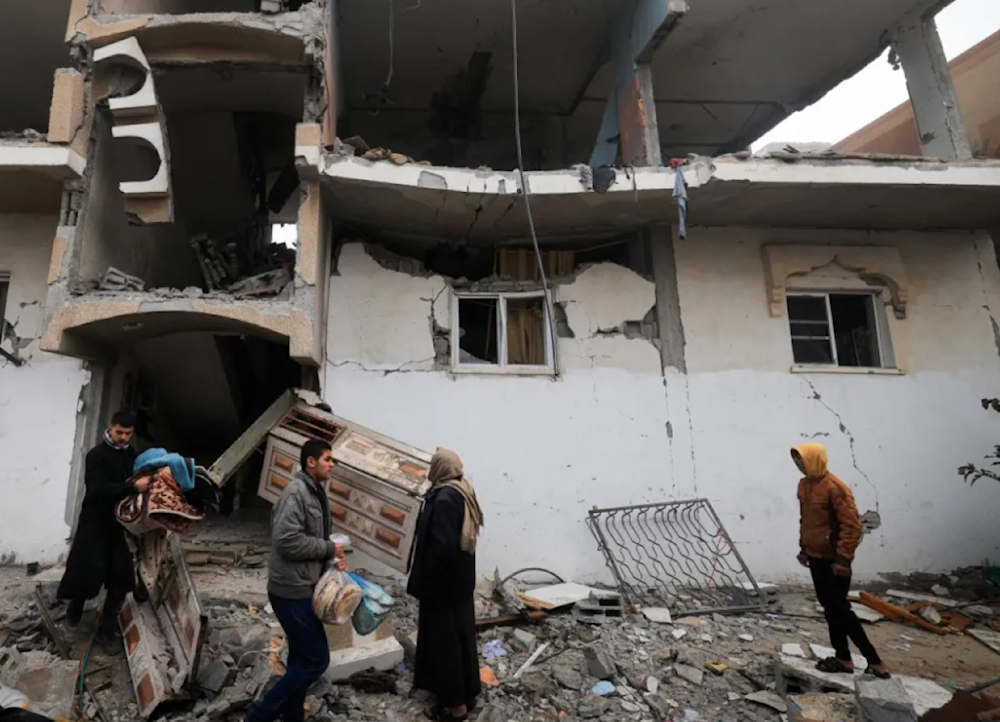Hawaii House, Senate pass Gaza ceasefire resolution
Senators want the Biden administration to advocate for an immediate and lasting ceasefire, as per the resolution.
-

Palestinians salvage belongings from the rubble of a destroyed building in Rafah by Israeli strikes. (AFP)
The Hawaii House of Representatives joined the state Senate demanding a ceasefire in the war on Gaza, which has killed a staggering 34,535 martyrs and 77,704 injuries, marking the first state to take such action, Hawaii News Now reported.
The Senate passed the ceasefire resolution 24-1 in March, and the House approved it 48-3 on Friday. Although the lawmakers were the first to vote on a ceasefire resolution, the state legislature's Public Access Room informed HuffPost that it "does not have the force and effect of law" and does not require the governor's signature.
Senators want the Biden administration to advocate for an immediate and lasting ceasefire, as per the resolution.
Furthermore, Hawaii lawmakers demand that the administration "facilitate the de-escalation of hostilities to end the current violence, promptly send and facilitate the entry of humanitarian assistance into Gaza, including fuel, food, water, and medical supplies, and begin negotiations for lasting peace."
Read more: Hamas to mull latest ceasefire proposal with other factions
Given Hawaii's history of American merchants toppling the Hawaiian Kingdom with the help of US armed forces in 1893, pro-Palestine activists have argued that Hawaii has a significant connection to the war on Gaza.
Fatima Abed, a Palestinian and Puerto Rican founder of Rise for Palestine, told HuffPost, “People in Hawai’i, especially Native Hawaiians, are determined on this issue because it’s very jarring to know that our tax dollars are going to fund the genocide of another colonized people while, here at home, our government budgets aren’t covering the basic needs of the people."
Abed, who has family in Gaza, expressed that Lahaina was neglected after wildfires ravaged the state last August, adding that "the people of Hawaii see that money being sent overseas to hurt people instead of helping here, and it makes no sense."
The Israeli aggression on Gaza has been ongoing for 207 days and over the past 24 hours, the Gaza Strip Ministry of Health recorded five massacres committed by the IOF against families in the Strip, killing 47 and injuring 61.
Ceasefire, complete withdrawal of IOF crucial to end war: PIJ spox
The spokesperson for the Palestinian Islamic Jihad Movement, Musab al-Breim, told Al Mayadeen that "the war will not end except with the cessation of aggression and the withdrawal of the enemy," emphasizing that "these principles are non-negotiable."
Al-Breim further stated that "the Resistance is awaiting the retreat of the enemy, which has proven its failure on the field," reaffirming that there is coherence across the region's Axis of Resistance.
The spokesperson further stressed that "the Resistance remains strong and active across the battlefield, and the political track must match the heroism of the battlefield."
Al-Breim also conveyed greetings to the forums of awareness in America, Europe, and Arab countries, coinciding with global university-led protests and sit-ins in solidarity with Gaza.
Meanwhile, Israeli Prime Minister Benjamin Netanyahu said on Tuesday that an invasion of the densely-populated Rafah city will take place regardless of whether an exchange deal with the Palestinian Resistance was reached or not.
"The idea that we will stop the war before all its goals have been achieved is irrelevant. We will enter Rafah and destroy Hamas battalions there, with or without an agreement [on hostages], to achieve absolute victory," he told families of the captives held in the Strip.
For many weeks now, Israelis have been flooding the streets of "Tel Aviv" and several other areas, demanding that Netanyahu resign over his performance in the war on Gaza, including his continued dismissal of an exchange deal.
According to Channel 13, around 45,000 people demonstrated in "Tel Aviv" last Saturday, while organizers said the number was 100,000. Protesters said that the political leadership seemed removed from the predicament of captives, noting that negotiators would frequently share photographs and anecdotes about the captives to help lawmakers be more empathetic.

 4 Min Read
4 Min Read








